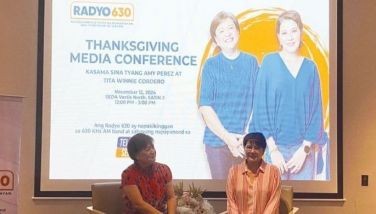How it all began for Gloria
June 16, 2004 | 12:00am
 Gloria Romero’s Spanish-American mother, Mary Borrego Miller, never saw the Philippines liberated from the clutches of the Japanese forces.
Gloria Romero’s Spanish-American mother, Mary Borrego Miller, never saw the Philippines liberated from the clutches of the Japanese forces.
After the war, Pedro Galla raised the four children by himself. Gloria was 11 during the liberation period and it was at this point of her life when she began spinning dreams of becoming a movie actress – "even if I had no idea how it was to become one," she says now. And the fact that she looked like Olive Oyl (which was how she described herself then) didn’t discourage her from becoming a glamorous star on the big screen.
As soon as she completed her secondary education – at the Riverview High – she asked her father’s permission to allow her to come to Manila so that she may pursue her dream of becoming an actress.
Her father eventually gave his permission – on the condition that "we all move to Manila together." The Gallas were going through a tough reversal of fortune then and Pedro felt maybe their luck would change in the big city.
In Manila, Pedro Galla went into the buy-and-sell business, while Gloria – upon the advice of family friend Jaime Castellvi – knocked on the gates of Premiere Productions where she was hired as extra in two pictures: Prinsipe Don Juan (with Efren Reyes and Anita Linda) and Bahay na Tisa (starring Leila Morena).
She didn’t stay long in Premiere. She was too thin and didn’t speak Tagalog well either – so the Premiere matriarch Doña Adela Santiago told her.
Although disheartened, she wasn’t completely discouraged from pursuing her dream of becoming a film star. She went to Sampaguita Pictures next and with the help of a distant uncle, Nardo Rosales, then the film company’s chief editor, Gloria was presented to Mrs. Dolores Vera in one Christmas party at the Vera-Perez compound. Although the Sampaguita studio matriarch wasn’t easily impressed, at least, she was more encouraging. Mrs. Vera told Gloria to visit the studio from time to time.
Gloria actually went there every day – in the hope of getting a job as an extra. She was cast – in a crowd scene – in the Pancho Magalona-Tita Duran film Kasintahan sa Pangarap. She languished in more extra roles in Bernardo Carpio, Barbaro, Dugong Bughaw and Prinsesa at Pulubi, where she was flattered no end because "ginawa akong tagahawak ng kapa ni Tessie Agana."
One day, her dream of becoming a film star almost came to an end when one of the studio buildings caught fire – in the process burning several films already in the can. "Ano ba ito? Hindi pa ako sumisikat, nasunog na ang studio," she wept bitterly.
But thanks to studio camaraderie, everyone agreed to re-shoot the films that were burned – either at half the price or for free. Sampaguita Pictures eventually rose from the ashes – mainly on the strength of the successful box-office performance of Tessie Agana’s Roberta.
Probably as a reward for her dedication and loyalty to the studio, Mrs. Vera told her son-in-law, Dr. Jose Perez, to give Gloria a second look. But Dr. Perez wasn’t impressed. Mestizas like her are dime a dozen in Quiapo, he countered. "But maybe you can give her a close-up in her next film," Mrs. Vera insisted.
Gloria got more than a close-up – a speaking part actually – in her next movie, Dr. Ramon Selga, starring Pancho Magalona. Her line: "Yes, doctor."
In time, the Vera-Perezes realized Gloria was ripe for secondary parts. But first, they needed a new name for her. Dr. Perez didn’t like the sound of Galla. He was also about to change her first name when Gloria pleaded to please retain it because it was her father who gave it to her. Dr. Perez agreed, but Galla had to go. He gathered studio employees to think of a surname for their young talent. Then, he asked Gloria who her first director was. Eddie Romero in Kasintahan sa Pangarap, she replied. That was it. Her screen name was going to be Gloria Romero.
So it was the name Gloria Romero that saw second billing in her next film, Artemio Tecson’s Madame X, starring Alicia Vergel.
In Palasig, she attained leading lady status and played a princess oppposite Cesar Ramirez. On the set, Tecson, her director, also served as acting coach to her, while she was tutored in Tagalog by Horacio Morelos, a Tagalista from Bulacan and grandfather of Jolina Magdangal.
Since Tita Duran was always on the family way and Alicia Vergel was constantly breaking her tendons in her action pictures, most of the leading lady parts were eventually given to Gloria. In Monghita, she was given the chance to play the title role (with Oscar Moreno as leading man).
In no time at all, her fan following became so big she was deemed strong enough to carry a film by herself. Her movies, in fact, were used as launching vehicles for actors being promoted to leading men status: Pilya, Ric Rodrigo’s first starring role (the movie where Lolita Rodriguez was billed as "introducing") and Despachadora, where Luis Gonzales was made leading man for the first time in his career.
There was a time, however, when Gloria also asked (begged was more like it) Dr. Perez to pair her with the great Rogelio de la Rosa. Request granted. She played his leading lady in Artista.
Under her Sampaguita contract, Gloria was made to do eight films a year. Among her favorites, she says, were Hindi Basta-basta, Kurdapya and Miss Tilapia.
But movie fans of her generation – so they still tell her today – remember her two films: Dalagang Ilocana, for which she won her first Best Actress trophy (1954) and Cofradia.
Cofradia is a project she’ll never forget if only for those arduous makeup sessions she went through during the filming of the movie. Playing an extremely dark-skinned young woman whose complexion turned fair every time a magic candle was lit, she would report to the set at 5:30 a.m. to have her skin blackened with the use of cosmetics. (For the trick shots where her skin would turn from dark to fair, they used red makeup). Oh, what a chore it was to put on – and remove! – that black makeup. Her skin, she swears, was sore and red at the end of production.
In the mid-‘60s, after spending 16 years in Sampaguita (the only star who stayed that long under contract in the studio), Gloria Romero deemed it was time to move on and do films for other companies on a freelance basis.(To be concluded)
BrandSpace Articles
<
>
- Latest
- Trending
Trending
Latest
Trending
Latest
Recommended





























